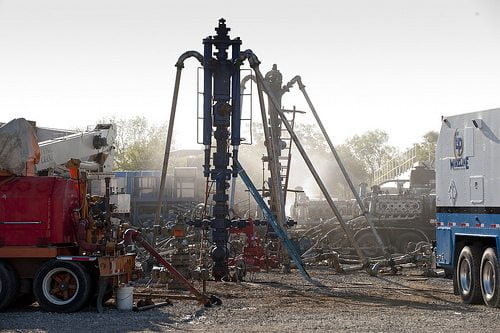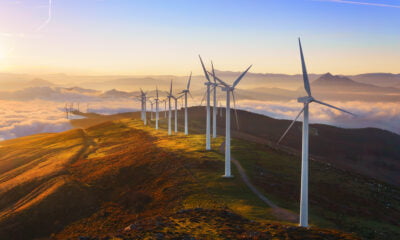

Energy
Green economy lauds benefits of renewables in response to fracking industry report
Developing the shale gas industry in the UK could attract investment of £33 billion and create 64,000 new jobs, according to a new report that environmental campaigners argue is “rose-tinted”.
The report, carried out by consultancy firm EY and commissioned by the onshore oil and gas industry body UK Onshore Operators Group (UKOOG), investigated how much spending would be required to exploit UK reserves.
It estimates that spending of around £33 billion will be needed to create around 4,000 fracking wells over an 18-year period. At its peak, the study says this supply chain would be able to provide around 64,000 jobs.
“This is a unique opportunity to secure the future of next generations of energy users, but industry and government need to take action now for the necessary infrastructure, supply chain standards and skills to be ready in time”, said Chris Lewis, the author of the report
The government has already begun its efforts to encourage a UK fracking boom, comparable to that of the US, by offering sizable tax breaks to the industry.
Commenting on the findings Michael Fallon, UK minister of state for business and energy, said the report was a “call to action”.
He added, “The message is to get ready for shale.”
However, scientists, environmentalists and governments across the world hold a number of concerns over the possible impacts of the fracking.
The process works by fracturing rocks with water and chemicals, releasing the natural gas contained within them. It has been linked to water contamination, leakage of the potent greenhouse gas methane and an increased risk of earthquakes.
Dr Doug Parr, chief scientist and policy director at Greenpeace UK, argued that the EY report was “a rehash of rose-tinted industry guesstimates.
“Paying accountants to tally up hypothetical jobs won’t change the fact that executives still have no idea whether they’ll actually be able to get gas out of the ground on a commercial scale in the UK,” he said.
“Scratch beneath the hype and this report is actually a veiled plea for government and taxpayer support for an industry that has stalled before even taking off.”
Some supporters argue that a shale gas revolution could help the UK cut its carbon emissions, aiding efforts to limit climate change.
The Intergovernmental Panel on Climate Change’s (IPCC) most recent study did concede that shale gas could play a role in decarbonisation, but only as a short-term option.
Instead, the IPCC say that a trillion-dollar shift in investment towards renewable energy is urgently needed.
According to the Renewable Energy Association (REA), there are already over 100,000 jobs across the renewable energy value chain. It argues that investing in renewables, rather than shale gas infrastructure, is the better bet.
“The shale gas industry has government’s unwavering support, and yet according to its own figures its potential for jobs is less than the renewables industry already achieves in the UK”, said REA head of public affairs James Court.
“Renewables are delivering today, while any potential benefits from shale gas are still some way off. Renewable energy is attracting investment, creating jobs, cutting costs, improving our energy security and preserving our environment.”
On Wednesday, the government announced that deals were done for eight major renewable projects, promising 8,500 new jobs.
Photo: UKBERRI_net via Flickr
Further reading:
Eight renewables projects given go-ahead in ‘green energy investment boom’
More research needed into health impacts of fracking, experts warn
Renewable electricity share at 15% in 2013 as UK emissions fall 2%
Poll: two-thirds of Britons favour wind power over fracking
Government’s fracking focus threatens renewables investment, experts say


 Environment12 months ago
Environment12 months agoAre Polymer Banknotes: an Eco-Friendly Trend or a Groundswell?

 Features11 months ago
Features11 months agoEco-Friendly Cryptocurrencies: Sustainable Investment Choices

 Features12 months ago
Features12 months agoEco-Friendly Crypto Traders Must Find the Right Exchange

 Energy11 months ago
Energy11 months agoThe Growing Role of Solar Panels in Ireland’s Energy Future




























